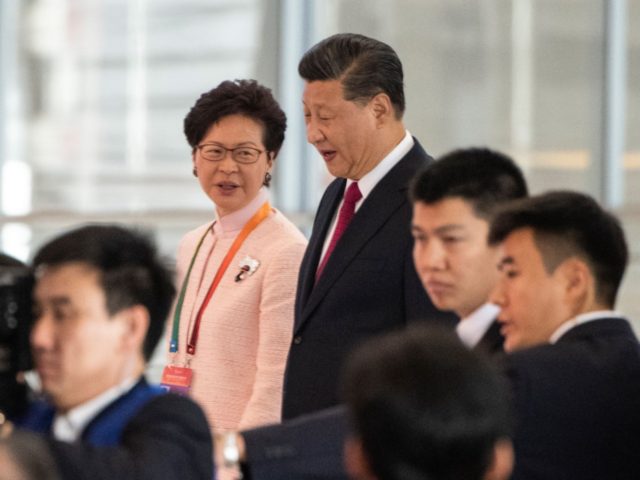Chinese dictator Xi Jinping applauded Hong Kong Chief Executive Carrie Lam during her visit to Beijing Monday for her “courage” in leading a violent crackdown on pro-democracy protesters, describing the past year as the “grimmest” since China seized the capitalist city from British control.
Hong Kong has faced half a year of protests following the announcement of a proposed bill that would have allowed China to extradite anyone present in Hong Kong into the repressive communist prison system. Millions of Hong Kong citizens have taken to the streets since June demanding that China not be allowed to punish Hong Kong residents accused of violating Communist Party law. The protesters have made another four demands, including the right to directly elect their lawmakers and freedom for imprisoned protesters, but Lam has refused to address them.
In September, Lam ceded to commanding the Legislative Council to withdraw the extradition bill from consideration. The bill would have been a violation of “One Country, Two Systems” – the policy in place that prevents Hong Kong from seeking independence and China from imposing communist laws on Hong Kong – as a perceived violation of communist law could have landed a Hong Kong resident in Chinese prisons.
Lam is the least popular Hong Kong chief executive in Hong Kong’s history since becoming part of China. Rumors have circulated for months of Communist Party officials in Beijing considering replacing her and audio captured by Reuters in September revealed Lam, speaking privately, claiming that she would like to resign from her position, but Beijing would not let her. An unnamed Hong Kong government official similarly told Reuters it would be too shameful for Xi for Lam to resign as early as mid-June.
Xi made no indication that Lam’s job was in jeopardy in his meeting with her on Monday, part of an annual scheduled visit by the Hong Kong leader.
“The central government fully recognizes the courage and responsibility you have shown during a moment of crisis in Hong Kong,” Xi told Lam in their meeting, according to various reports. He claimed that 2019 was the “grimmest and most complex year” for Hong Kong since China took over the city and reportedly told Lam he would offer “unwavering support” in light of her “very courageous” stance against the demands of her people.
“The central government will continue to support [Lam] and the Hong Kong government in governing with the police, and to support the Hong Kong police in enforcing the law strictly. We also hope all sectors of Hong Kong society remain united in putting the city’s development back on track,” Xi continued.
“He added that the central government fully supports the SAR’s police in enforcing the law, and he urged the people of Hong Kong to remain united to restore calm and order as soon as possible,” the Hong Kong broadcaster RTHK said in its report on Xi’s comments.
Xi’s apparent concern over Hong Kong followed a year in which he barely commented on the protests engulfing his country, even as regime-controlled state media disparaged the largely peaceful protests as uncontained “riots.” By August, two months into the protest movement, state media reprinted remarks that Xi made in light of protests in 2017, making glaringly clear his absence as a leader during the current crisis for the Party.
In his end-of-year review speech to the Communist Party last week, Xi lamented that 2019 was a “challenging” year for communist leaders, a marked change in tone from his declarations of triumph and conquest in his three-hour 2017 speech to the Communist Party Congress, which convenes every five years.
Chinese Premier Li Keqiang offered a similarly dire analysis of the situation in Hong Kong for communists in his meeting with Lam.
“A clear fall has been shown in Hong Kong’s economy, and many sectors have been dealt a serious blow. We can say that [Hong Kong] is facing unprecedented, difficult and complicated circumstances,” Li said.
He applauded Lam for “leading Hong Kong’s government in doing your best to safeguard social stability” and working to “stabilize employment.” Both Lam and the Communist Party have repeatedly claimed that protesters’ demands for democracy and fears that, under the Chinese Communist Party, they would be subject to the same human rights atrocities as those within China are actually manifestations of concerns with Hong Kong’s job and housing markets.
“It can be said that you rose to the challenges even though it was not an easy task. The central government fully acknowledges the efforts you and the Hong Kong government has made,” Li told Lam.
The Hong Kong protesters have repeatedly insisted that their concerns are about China’s authoritarianism, not the state of Hong Kong’s economy.
“We are now officially a police state, where people live in constant fear of political repercussions,” Hong Kong activist and artist Denise Ho told Congress this summer. “Police would give favorable treatment to mobs and pro-Beijing supporters, helping them leave the sites after having attacked protesters, showing clear and continuous collusion between police and triad members.”
“If Hong Kong falls, it would easily become a springboard for the totalitarian regime of China to push its rule and priorities overseas, utilizing its economic powers to conform others to their communist values, just as they have done with Hong Kong in the past 22 years,” she asserted. “The U.S. and its allies have everything to fear if they wish to maintain a world that is free, open, and civil.”
Lam flew into Beijing on Saturday. She last visited Beijing in October, invited to attend a parade to celebrate Xi Jinping on the occasion of the 70th anniversary of the violent communist takeover of China.

COMMENTS
Please let us know if you're having issues with commenting.